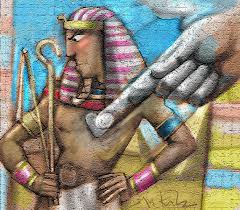The thought that a God who is supposed to be pure goodness nevertheless rules through all tragedy and suffering by absolute necessity is exceedingly offensive. Theologians and philosophers try continually to remove the offense, usually by shifting the blame from God to humans or by making distinctions in the concept of necessity, like “necessity of consequence” over against “necessity of the thing consequent.” But as we have already seen, this only makes matters worse. It puts the reputed believer in the position of God, which is, of course, the essence of sin. The prime example of this in the argument between Luther and Erasmus is the case of the hardening of Pharaoh’s heart.
Erasmus was mightily offended by the scriptural word which has God claiming that he would harden Pharaoh’s heart in order to bring the Exodus about. Erasmus was offended, of course, because such action on God’s part would negate the contribution of free will to the whole matter. Erasmus had to find some way to exonerate God and shift the blame to Pharaoh. The device Luther sees in Erasmus’ argument is what they called in those days a “trope,” a figure of speech. That is, the statement that God would harden Pharaoh’s heart was not to be taken literally; it was really just a manner of speaking, a trope. Thus what the statement really means is that Pharaoh hardened his own heart, “as it were,” when God”withdraws.” To save free choice, it must be granted some “working-room.” room.” But then free choice moves in at the expense of God and his activity. God is to be simply moved off the scene. He is exonerated at the expense of his omnipotence.It would also mean that Pharaoh is ultimately in charge of the Exodus, for Pharaoh is the real actor on the stage. Luther was infuriated by this decimation of God’s majesty and power as well as, eventually, God’s mercy. Indeed, one could say that this kind of move by Erasmus is responsible for the demise of a serious doctrine of God in the church ever since. It is crucial to the argument to note that the attempt to grant to free choice even the smallest place in the Exodus results in denigrating both God and man.
From “The Captivation of the Will- Luther and Erasmus on Freedom and Bondage” by Gerhard Forde



OK. I am going to get the book! I have read, re-read several times now and I shall never look at Mark six the way I did in the past. I always wondered why Jesus wanted to pass them by. How profound to me that it demonstrates his mastery over all the chaos and sin of the world…the hardening of the hearts that isn’t God doing it at all. Am I getting this right??? Thanks for the most interesting blog. Nice to know where to find it in case I need to read it again!
Joann